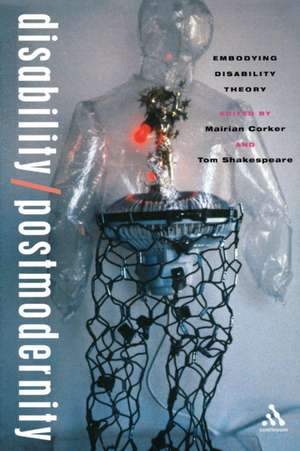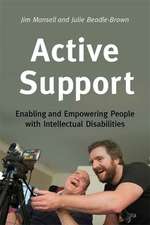Disability/Postmodernity: Embodying Disability Theory
Editat de Mairian Corker, Tom Shakespeareen Limba Engleză Paperback – 30 apr 2002
Preț: 305.59 lei
Preț vechi: 357.08 lei
-14% Nou
Puncte Express: 458
Preț estimativ în valută:
58.48€ • 61.21$ • 48.67£
58.48€ • 61.21$ • 48.67£
Carte tipărită la comandă
Livrare economică 31 martie-14 aprilie
Preluare comenzi: 021 569.72.76
Specificații
ISBN-13: 9780826450555
ISBN-10: 0826450555
Pagini: 264
Dimensiuni: 157 x 236 x 14 mm
Greutate: 0.39 kg
Ediția:New.
Editura: Bloomsbury Publishing
Colecția Continuum
Locul publicării:London, United Kingdom
ISBN-10: 0826450555
Pagini: 264
Dimensiuni: 157 x 236 x 14 mm
Greutate: 0.39 kg
Ediția:New.
Editura: Bloomsbury Publishing
Colecția Continuum
Locul publicării:London, United Kingdom
Cuprins
Contributors
Foreword by Iris Marion Young
1. Mapping the Terrain Mairian Corker and Tom Shakespeare
2. A Journey around the Social Model Carol Thomas and Mairian Corker
3. On the Subject of Impairment Shelley Tremain
4. A Postmodern Disorder: Moral Encounters with Molecular Models of Disability Jackie Leach Scully
5. Bodies Together: Touch, Ethics and Disability Janet Price and Margrit Shildrick
6. The Body as Embodiment: An Investigation of the Body by Merleau-Ponty Miho Iwakuma
7. Disability in the Indian Context: Post-colonial Perspectives Anita Ghai
8. Cultural Maps: Which Way to Disability? Tanya Tichkosky
9. Defusing the Adverse Context of Disability and Desirability as a Practice of the Self for Men with Cerebral Palsy Russell P. Shuttleworth
10. Changing the Subject: Postmodernity and People with "Learning Disabilities" Dan Goodley and Mark Rapley
11. Madness, Distress and Postmodernity: Putting the Record Straight Anne Wilson and Peter Beresford
12. Countering Stereotypes of Disability: Disabled Children and Resistance John Davis and Nick Watson
13. Estranged-Familiarity Rod Michalko
14. Image Politics without the Real: Simulacra, Dandyism and Disability Fashion Petra Kuppers
15. De-gene-rates, Replicants and Other Aliens: (Re)defining Disability in Futuristic Film Johnson Cheu
16. Naming and Narrating Disability in Japan James Valentine
17. The Crooked Timber of Humanity: Disability, Ideology and the Aesthetic Anita Silvers
Index
Foreword by Iris Marion Young
1. Mapping the Terrain Mairian Corker and Tom Shakespeare
2. A Journey around the Social Model Carol Thomas and Mairian Corker
3. On the Subject of Impairment Shelley Tremain
4. A Postmodern Disorder: Moral Encounters with Molecular Models of Disability Jackie Leach Scully
5. Bodies Together: Touch, Ethics and Disability Janet Price and Margrit Shildrick
6. The Body as Embodiment: An Investigation of the Body by Merleau-Ponty Miho Iwakuma
7. Disability in the Indian Context: Post-colonial Perspectives Anita Ghai
8. Cultural Maps: Which Way to Disability? Tanya Tichkosky
9. Defusing the Adverse Context of Disability and Desirability as a Practice of the Self for Men with Cerebral Palsy Russell P. Shuttleworth
10. Changing the Subject: Postmodernity and People with "Learning Disabilities" Dan Goodley and Mark Rapley
11. Madness, Distress and Postmodernity: Putting the Record Straight Anne Wilson and Peter Beresford
12. Countering Stereotypes of Disability: Disabled Children and Resistance John Davis and Nick Watson
13. Estranged-Familiarity Rod Michalko
14. Image Politics without the Real: Simulacra, Dandyism and Disability Fashion Petra Kuppers
15. De-gene-rates, Replicants and Other Aliens: (Re)defining Disability in Futuristic Film Johnson Cheu
16. Naming and Narrating Disability in Japan James Valentine
17. The Crooked Timber of Humanity: Disability, Ideology and the Aesthetic Anita Silvers
Index
Recenzii
Disability/postmodernity does well to signal the emergence of a new postmodernist sensibility that has largely failed to emerge from the 'social model' approach to disability research. I found the book both engaging and enjoyable and thoroughly recommend it.
Descriere
This text looks at the study of disablity within the context of the "postmodern" world of the 21st century. The authors aim to demystify the concept of postmodernity and to suggest ways in which it fosters a holistic approach to the study of disability.

















